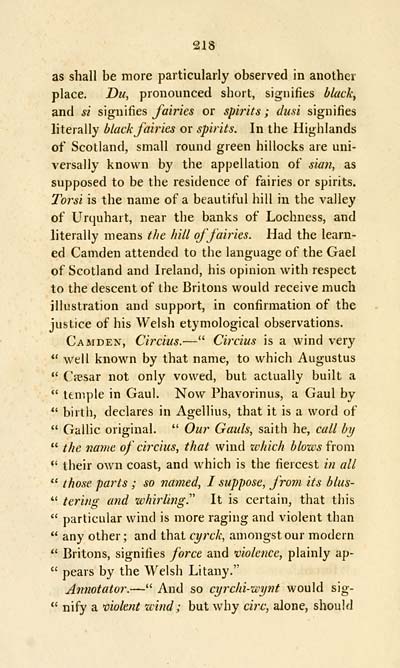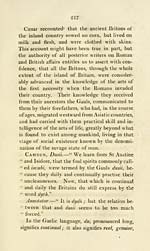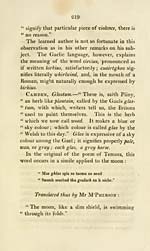Download files
Complete book:
Individual page:
Thumbnail gallery: Grid view | List view

218
as shall be more particularly observed in another
place. JDw, pronounced short, signifies blacky
and si signifies yairie-s or spirits; dusi signifies
literally black fairies or spirits. In the Highlands
of Scotland, small round green hillocks are uni-
versally known by the appellation of sian, as
supposed to be the residence of fairies or spirits.
Tor^si is the name of a beautiful hill in the valley
of Urquhart, near the banks of Lochness, and
literally means the hill of fairies. Had the learn-
ed Camden attended to the language of the Gael
of Scotland and Ireland, his opinion with respect
to the descent of the Britons would receive much
illustration and support, in confirmation of the
justice of his Welsh etymological observations.
Camden, Circius. — " Circius is a wind very
" well known by that name, to which Augustus
" Ciesar not only vowed, but actually built a
" temple in Gaul. Now Phavorinus, a Gaul by
" birth, declares in Agellius, that it is a word of
" Gallic original. " Our Gauls, saith he, call by
" the name of circius, that wind zvhich blows from
*' their own coast, and which is the fiercest in all
" those parts ; so named, I suppose, from its blus-
*' tering and whirling.'' It is certain, that this
" particular wind is more raging and violent than
" any other; and that cyrck, amongst our modern
*' Britons, signifies force and violence, plainly ap-
" pears by the Welsh Litany."
Annotator. — " And so cyrchi-wynt would sig-
" nify a molent wind ; but why circ, alone, should
as shall be more particularly observed in another
place. JDw, pronounced short, signifies blacky
and si signifies yairie-s or spirits; dusi signifies
literally black fairies or spirits. In the Highlands
of Scotland, small round green hillocks are uni-
versally known by the appellation of sian, as
supposed to be the residence of fairies or spirits.
Tor^si is the name of a beautiful hill in the valley
of Urquhart, near the banks of Lochness, and
literally means the hill of fairies. Had the learn-
ed Camden attended to the language of the Gael
of Scotland and Ireland, his opinion with respect
to the descent of the Britons would receive much
illustration and support, in confirmation of the
justice of his Welsh etymological observations.
Camden, Circius. — " Circius is a wind very
" well known by that name, to which Augustus
" Ciesar not only vowed, but actually built a
" temple in Gaul. Now Phavorinus, a Gaul by
" birth, declares in Agellius, that it is a word of
" Gallic original. " Our Gauls, saith he, call by
" the name of circius, that wind zvhich blows from
*' their own coast, and which is the fiercest in all
" those parts ; so named, I suppose, from its blus-
*' tering and whirling.'' It is certain, that this
" particular wind is more raging and violent than
" any other; and that cyrck, amongst our modern
*' Britons, signifies force and violence, plainly ap-
" pears by the Welsh Litany."
Annotator. — " And so cyrchi-wynt would sig-
" nify a molent wind ; but why circ, alone, should
Set display mode to: Large image | Transcription
Images and transcriptions on this page, including medium image downloads, may be used under the Creative Commons Attribution 4.0 International Licence unless otherwise stated. ![]()
| Early Gaelic Book Collections > Ossian Collection > Thoughts on the origin and descent of the Gael > (230) |
|---|
| Permanent URL | https://digital.nls.uk/82237204 |
|---|
| Description | Selected books from the Ossian Collection of 327 volumes, originally assembled by J. Norman Methven of Perth. Different editions and translations of James MacPherson's epic poem 'Ossian', some with a map of the 'Kingdom of Connor'. Also secondary material relating to Ossianic poetry and the Ossian controversy. |
|---|
| Description | Selected items from five 'Special and Named Printed Collections'. Includes books in Gaelic and other Celtic languages, works about the Gaels, their languages, literature, culture and history. |
|---|

